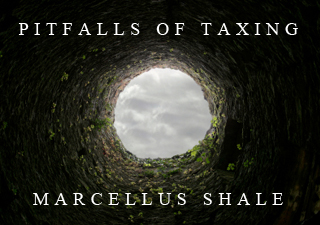Commentary

Taxing Gas will Burden Pennsylvanians
Despite a deep recession, Marcellus Shale gas drilling in Pennsylvania has created tens of thousands of jobs, rescued many landowners from foreclosure and bankruptcy, and generated fortunes for farmers, laborers, and businesses. Nevertheless, some have stoked fears of environmental disaster and spread the myth that drillers aren’t paying their share of taxes. Such attacks have led many to the mistaken conclusion that the industry should pay a special tax or what’s euphemistically called an “impact fee.”
While a tax on natural gas would not drive the industry out of the state, it would be passed on to residents – folks like Jim VanBlarcom, a Bradford County dairy farmer who testified that leasing a small portion of his land for drilling enabled him to double his herd. He’s not alone: Pennsylvania’s gas industry is estimated to have produced more than $7 billion in lease and royalty payments since 2006. Moreover, it’s given rural areas thousands of new jobs paying an average annual salary of nearly $70,000.
The influx of new employees means local governments have seen more revenue from the emergency and municipal services tax, which is withheld from workers’ paychecks. Other revenue streams have grown, too. Bradford County has received about $1 million from the drilling industry in recording and copying fees alone. And drillers have paid $1.1 billion in state taxes since 2006, according to the Department of Revenue.
But even if local residents and governments are benefiting, some feel the industry should pay more to do business in the Keystone State. This notion is bolstered by a misperception, often promoted by environmental interests, that gas companies avoid taxes through some loophole.
But drillers pay the same taxes as every other business in the state, and those taxes rank among the highest of their kind. Pennsylvania has the 10th-highest state and local tax burden in the nation, and the second-highest corporate income-tax rate in the world.
That drillers pay the same taxes as other businesses isn’t good enough for some, though. They argue that gas extraction imposes environmental and other costs that justify an extraordinary tax. Most of us care about the environment and believe businesses should pay for the government they use, but those calling for an additional tax or fee on drillers fail to understand the industry’s true impacts or contributions.
In recommending an impact fee, Gov. Corbett’s Marcellus Shale Advisory Commission provided anecdotal examples of potential drilling impacts. But these must be compared with what gas companies contribute.
In addition to state and local taxes, gas drillers voluntarily spent more than $200 million on road repairs and improvements in 2010 alone. Ultimately, Pennsylvania law ensures that drilling companies, not taxpayers, are responsible for whatever environmental and infrastructure damage they cause. And the fees drillers pay to the state Department of Environmental Protection cover the cost of inspections.
Some of the pro-tax pressure is coming from special interests that want more funding for pet programs such as “Growing Greener.” Set to lose its funding this year, the program subsidizes a wide range of projects, from alternative energy to downtown redevelopment. In fact, some of the groups pushing for the tax have received such subsidies. No matter how lawmakers or lobbyists sell it, though, Growing Greener has nothing to do with drilling impacts.
Despite the manufactured fears of disaster and cheers for a unique tax on drilling, Pennsylvania can balance economic growth with environmental protection without imposing a new tax. The true impacts of drilling can be addressed by charging drillers fees for services provided, requiring them to be insured for environmental costs, and other measures.
Any impact fee must identify specific costs tied to drilling and demonstrate that they are not already being covered. Otherwise, another tax or fee on the industry is really just a punitive tax on Pennsylvania’s people and prosperity.
###
Matthew J. Brouillette is President and CEO of the Commonwealth Foundation (www.CommonwealthFoundation.org), an independent, nonprofit public policy research and educational institute based in Harrisburg.